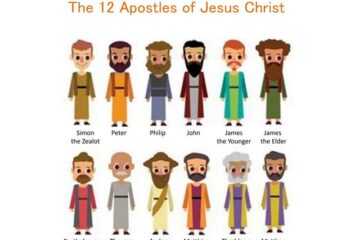A question was posed that was interesting and a common one to non-denominational churches of Christ. The question goes like this: “I consider myself to be a Christian yet I choose to worship at a Baptist (or some other) denominational church. Are you teaching that just because I am not a member of the churches of Christ that I am going to hell?”
To answer this type of question, one first has to understand what the church is that Jesus said He would build. Second to this involves a reflection of self as to whether or not you are worshipping God or indirectly, yourself, and whether you are doing so with a full knowledge of the biblical requirements. Lastly, it is important to recognize that only God, through Jesus, determines the destiny of our souls. So no one on this earth can tell you where you’ll end up for eternity. That said, our God cannot tell a lie (Tit. 1:2) and if He says in the NT scriptures that we are to do certain things and in a certain way, if we do not comply with His ordinances, we are subject to judgement. So lets deal with the first question. What was the church that Jesus said He would build and does He sanction all these denominations that exist today?
Mat. 16:18, Jesus says “And I tell you, you are Peter, and on this rock I will build my church, and the gates of hell shall not prevail against it.” (emphasis added)
In this text, Jesus acknowledges Peter’s statement from verse 16 where he says “Jesus is the Christ”. Jesus then says, “I will build my church…” so it is natural to want to know exactly what that means.
As an aside, Jesus did not build the church based on Peter himself as this wouldn’t make sense. It was an acknowledgement of the statement that Peter made, it not being revealed to him except by inspiration. However, this is the first mention of the word “church” (ekklesia, meaning assembly) in the NT. So the church is the central place of worship and where the common salvation begins and is shared among believers.
"Beloved, although I was very eager to write to you about our common salvation, I found it necessary to write appealing to you to contend for the faith that was once for all delivered to the saints" Jude 3 (ESV - emphasis added)Jude is expressing a sense of urgency to write about something, that something is the common salvation. He also expresses a need to appeal to our minds to contend for a faith that was once for all delivered to the saints. Two key things in the latter part of this message; contend for THE faith, meaning there’s only one that matters and that faith was once and for all delivered to the saints. The once and for all appears to mean that there are no subsequent faiths to be delivered. The saints here are those that belong to Christ (Gal. 3:27; 2Co. 9:1, 13:13; 1Co. 16:1; Rom. 1:7; Rev. 14:12). The word “saints” means those that are considered to be children of God. Those that have accepted Christ and shown that acceptance through repentance and baptism. A saint is not any and everyone who simply believes nor does it impart some special title as a sign of extraordinary behavior.
Unity of the church is noted throughout the New Testament scriptures. The salvation of all men and women is contingent upon everyone not only having a common belief and a common purpose but having everything of a spiritual nature in common to include doctrine and worship.
- Eph. 4:1-4 – I therefore, a prisoner for the Lord, urge you to walk in a manner worthy of the calling to which you have been called, with all humility and gentleness, with patience, bearing with one another in love, eager to maintain the unity of the Spirit in the bond of peace. There is one body and one Spirit—just as you were called to the one hope that belongs to your call— one Lord, one faith, one baptism, one God and Father of all, who is over all and through all and in all.
- Jn. 17:20–23 – “I do not ask for these only, but also for those who will believe in me through their word, that they may all be one, just as you, Father, are in me, and I in you, that they also may be in us, so that the world may believe that you have sent me. The glory that you have given me I have given to them, that they may be one even as we are one, I in them and you in me, that they may become perfectly one, so that the world may know that you sent me and loved them even as you loved me.
- 1 Co. 1:10 – I appeal to you, brothers, by the name of our Lord Jesus Christ, that all of you agree, and that there be no divisions among you, but that you be united in the same mind and the same judgment.
- Gal. 3:26–29 – 26 for in Christ Jesus you are all sons of God, through faith. For as many of you as were baptized into Christ have put on Christ. There is neither Jew nor Greek, there is neither slave nor free, there is no male and female, for you are all one in Christ Jesus. And if you are Christ’s, then you are Abraham’s offspring, heirs according to promise.
- Php 2:2 – complete my joy by being of the same mind, having the same love, being in full accord and of one mind.
This doesn’t mean that we won’t have occasional misunderstandings. Everyone is at a different stage of spiritual development. A new convert who is on the milk (Heb. 5:13) of the word will not understand as much as someone who has been a faithful Christian for many years and is on the meat of the word. The apostle Paul speaks of this dichotomy in Rom. 14:1-11. However, the important things of being a Christian including faith in Christ, living a life for Christ, doctrine and worship, and everything we are taught as given from the scriptures, must be common among all those who are truly in the body of Christ.
What we have in common began on the day of Pentecost, after the resurrection of Christ. The church was established at that point beginning in Acts 2 where the first gospel sermon was preached and respondents asked and were told what they must do to be saved (Acts 2:38ff). We are to then keep His commandments (Ecc. 12:13; 1Jo. 2:3-4, 3:22, 5:3; Joh. 14:15; Ps. 119:60; Pro. 3:1Rev. 14:12). We are reminded of the gospel message that was once and for all delivered (Rom. 1:16; 1Co. 15:1-4, Gal. 1:6-9, 11).
Acts 2:44, “And all who believed were together and had all things in common.”
Acts 4:32, “Now the full number of those who believed were of one heart and soul, and no one said that any of the things that belonged to him was his own, but they had everything in common.”
God said in prophecy what He was going to do in Jer. 32:37-39:
“Behold, I will gather them from all the countries to which I drove them in my anger and my wrath and in great indignation. I will bring them back to this place, and I will make them dwell in safety. And they shall be my people, and I will be their God. I will give them one heart and one way, that they may fear me forever, for their own good and the good of their children after them.”
This prophecy was made during Israel’s Assyrian captivity. God said when I bring them back to this place (Jerusalem), He would give them one heart and one way and it would be good for them and their children after them. This was a prophecy that came and was fulfilled with Jesus.
Jesus confirmed the prophecy in Luke 24 when he said repentance and remission of sins should be preached in his name among all nations beginning at Jerusalem. Repentance means a change of heart (mind) to do what is right according to the teachings of Jesus and the apostles. Remission of sins comes through baptism (Mat. 28:18-20; Joh. 3:5; Mar. 16:15-16; Acts 2:38; Rom. 6:4; Eph. 4:5; Gal. 3:27) which is required in order to become a member of the body of Christ (1Co. 12:27; Rom. 12:4; Eph. 4:4, 12) which is His church (Col. 1:18, 24) for which Christ is the head. Paul uses an analogy of this body and the church relationship in Eph. 5:29-30 in his admonition given to the husband and wife relationship. The husband and wife relationship is defined as one man and one woman. In similar form, Christ is the head of the one body and one church, which can be considered to be His bride (2Co. 11:2).
Denominationalism inherently means separation from another, even if the proposed cause be the same. Catholic, Methodist, Baptist, Presbyterian, Episcopalian, Mormon, Jehovah Witnesses, etc. All tend to point to Christ to some degree but all have different belief structures, different doctrines, different rights of acceptance, and different perceptions of the Holy Bible. They are all different faiths. You can learn more about these differences here. Does this sound like people of the “same mind” and having the “same judgement” and being of “one heart” in the “one body”?
The second question involves a self analysis and a level of personal honesty. Why do you go to (a) church? Is it because you find the services and people more conducive to what you like? This may not be the only reason but it’s very common. It is unnatural for people to attend something regularly that they don’t personally enjoy and church can feel like a club experience with the emotionally uplifting music and motivational speaker telling you what you want or feel you need to hear. Many people answering this question of ‘why’ they attend a particular congregation of people almost always speak in terms of self gratification, even if they sprinkle some ‘love of the Lord’ in their response. A generic answer might be, “I go to church to feel closer to God, seek spiritual growth, and build a sense of community with like-minded individuals.” Sounds good, right?! Read it again and the undertones of self gratification are there. Additionally, many people attend church for moral guidance, support during difficult times, and to simply participate in worship and service activities. The first purpose of worship is to give glory to God, regardless of your circumstances. You become closer to Him in study of the scriptures, prayer, and representing Christ to the best of your ability while living on this earth.
The apostle Paul told the Corinthians who were abusing the purpose of the Lord’s supper in 1Co. 11 to perform self examination prior to taking the bread and the cup.
“Let a person examine himself, then, and so eat of the bread and drink of the cup.” 1Co. 11:28
In his second letter, he admonished them to go further.
“Examine yourselves, to see whether you are in the faith. Test yourselves. Or do you not realize this about yourselves, that Jesus Christ is in you?—unless indeed you fail to meet the test!” 2Co. 13:5
For the penitent heart, it could be wise to add Psa. 26:2 to your prayers. “Prove me, O LORD, and try me; test my heart and my mind.”
So self-examination and particularly your motives for what you do with regards to worship are an important aspect to determining if you are part of the Common Salvation. Remember that people often like to fool themselves into believing whatever they want to believe and justifying behavior they desire to maintain. Nobody is exempt from this psychological phenomenon.
Lastly, keeping God’s commandments is necessary to be found centered within His will and for your life to be purposed for the cause of Christ. If you’re doing your own thing, God can’t use you to the best of your potential. It also means you are not willing to do what He says above what you want. This is disobedience, pure and simple or lawlessness aka sin. A disobedient child will be punished. It is conceivable that a person can live their entire lives, presumably, for the cause of Christ but because they chose to do things their way and not in accordance with the scriptures, they can find themselves lost forever (1Jo. 1:6, 2:4, 9; Mat. 7:13, 23).


